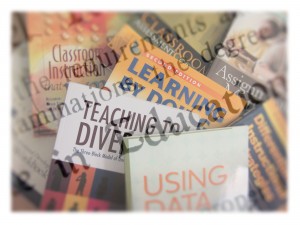 I have very few books in my office. Other than a shelf where I keep three particular books that have guided my career and the one or two professional reading selections I have on the go, my personal workspace is devoid of the rows of books one might expect to see adorning the shelves of the principal’s office.
I have very few books in my office. Other than a shelf where I keep three particular books that have guided my career and the one or two professional reading selections I have on the go, my personal workspace is devoid of the rows of books one might expect to see adorning the shelves of the principal’s office.
I do a great deal of professional reading. In fact, that is my preferred way to learn. To me however, a book loses its value after I have read it. Once consumed, it has little function beyond serving as a decorative accessory.
But for those who have not yet turned those pages, the value remains. For that reason, it is important to make this resource available to others. That is not likely to happen if it occupies a permanent sheltered spot upon a dusty shelf.
Every principal has a responsibility to meet the professional learning needs of staff. With what we know about learning and learning styles, we should know that it is important to establish even a small professional learning library in our schools.
Getting up and running
Where does one start? I feel it is important to have a mix of current titles related to teaching and learning, books on health and wellness, inspirational essays, as well as some standard classics.
You will find your own essential titles but from my perspective, here are some “must have” books:
• Servant Leadership – Robert Greenleaf
• Emotional Intelligence – Daniel Goleman
• On Death and Dying – Elizabeth Kubler Ross
• Classroom Instruction that Works – Robert Marzano
• Quiet – Susan Cain
• Multiple Intelligences – Howard Gardner
Whenever I am at an educational conference, I will make a point of stopping by the vendors’ table where one finds books authored by the keynote speaker. When possible, I will get the book signed by the author with a brief message for our school. It is a simple touch but has the potential to create a small connection between the author and professional library borrower.
From time to time, staff members will request certain titles. I try to ensure they find their way into an upcoming book order and a place on our library shelves.
Circulating and (sort of) managing the material
I believe in the honour system to circulate material. I invite not only staff to borrow anything that may appeal to them, but invite visitors to our school (clinicians, consultants, etc.) to treat this resource as their own.
Borrowed material practically always finds its way back to the shelf. If it doesn’t, it is usually because it had a profound impact on someone that they elected to retain it, or perhaps it found its way further afield. Either way, the resource is in the hands of someone that values it, and a replacement copy is easily acquired.
Location, location, location
 Endless shelves of professional reading material serve little purpose if housed in a private office. There may be an ongoing invite to others to help themselves, but to make things accessible as possible it is important to create an appropriate location to house the collection. It might be in the school library, the corner of the staff room, or any other location that staff can peruse the collection on their own time and their own terms. It is important that it is a public area that accessible to all staff. Consider taking a page from libraries and bookstores and install a comfortable reading chair or two.
Endless shelves of professional reading material serve little purpose if housed in a private office. There may be an ongoing invite to others to help themselves, but to make things accessible as possible it is important to create an appropriate location to house the collection. It might be in the school library, the corner of the staff room, or any other location that staff can peruse the collection on their own time and their own terms. It is important that it is a public area that accessible to all staff. Consider taking a page from libraries and bookstores and install a comfortable reading chair or two.
What example do you set?
I usually have a professional reading selection in my briefcase for those moments when I have the opportunity to get through a few pages and I encourage all staff to do the same. Where appropriate, I will share my thoughts on what I am reading and reference these sources in my discussions with teachers. Just as we encourage teachers to model reading to students, so should principals find ways to model the importance of professional reading to teachers.
Sometimes a book is a pretty good resource!
In our connected world, it is easy to rely on electronic resources to feed our hunger for professional reading material. Blogs (such as this one), web sites and other such resources provide bite sized pieces of information that can whet our appetites for more in depth sources. A balanced approach is most likely to contribute to building sound knowledge base. Without question, a current and well stocked learning library has an important place in the professional growth of staff.

